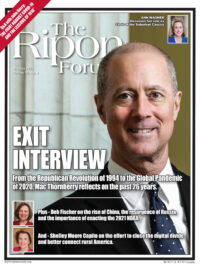Four challenges that will need to be addressed

The COVID-19 pandemic has exposed previously unrealized security challenges, ranging from food insecurity to vulnerable supply chains. The pandemic also provides an opportunity to address existing gaps to help ensure that future crises remain under control.
With this in mind, U.S. foreign policy needs to better reflect the interconnected nature of the big issues facing the world and respond to challenges posed by future pandemics, technology gaps, migration, climate adaptation and armed conflict.
Global response to pandemics
Despite the United States’ effective response to public health crises such as HIV/AIDS and the Ebola epidemic in West Africa, COVID-19 has provided ample evidence that the United States is highly vulnerable to viruses that emerge abroad. The United States needs to tackle public health challenges when and where they emerge to protect the health and security of its citizens.
Foreign assistance programs can help other countries prepare for future pandemics by improving the detection of outbreaks and bolstering public health responses in countries with weak healthcare infrastructure. This helps protect Americans. As the re-emergence of previously eradicated diseases such as polio and measles shows, no one is safe until everyone is safe.
Overcoming technology gaps
The COVID-19 pandemic prompted lockdowns around the world which demonstrated how access to technology shapes a range of outcomes, from business adaptability to healthcare delivery. The impact of technology gaps is far reaching, particularly when it comes to education.
U.S. foreign policy needs to better reflect the interconnected nature of the big issues facing the world.
At its peak, the pandemic forced 1.6 billion children out of the classroom. While distance-learning proved challenging even here in the United States, 600 million people lack access to electricity in sub-Saharan Africa and just 28% have regular internet access. Globally, only one in three students are expected to return to classrooms this fall. Because of technology gaps, millions of children are losing out on key skills, including digital literacy, that they need to reach their fullest human potential. This will have a long-term social and economic impact in developing countries.
Foreign assistance, particularly technical assistance and support for private investment, remains essential in extending access to broadband internet, cellular telecommunications, and clean energy to the world’s poorest and most remote regions. Attention to how technology gaps affect service delivery and outcomes should be a key part of U.S. foreign assistance programming.
Migration
India’s lockdown in response to the COVID-19 pandemic saw an estimated 40 million migrant workers return to their home villages in the Indian countryside. Many were forced to crowd on trains or walk for days, only to be turned away from villages weary of the virus’s transmission.
Mass migration prompted by disease outbreaks or natural disasters add greater complexity to a refugee system that was designed to deal with persons displaced by armed conflict. Migration is also a problem that is likely to worsen if the underlying challenges, including physical and economic insecurity, are not proactively addressed.
Climate adaptation and conflict prevention
While we can hope that climate scientists’ worst-case projections regarding sea-level rise or warming temperatures will not come about, in the coming decades both wealthy and poor nations will face the reality that people on nearly every continent will no longer be able to live or farm where they currently reside.
While conflict prevention has long been a focus of foreign assistance, the intersection of conflict prevention with other global challenges should be at the forefront of the United States’ response.
America needs to get ahead of this by working with governments to create incentives for relocation that will help minimize economic disruptions and conflicts that could impact the United States’ economy and security. Climate adaption is most pressing in parts of the world that are already fragile and prone to the outbreak of war and the emergence of terrorism. While conflict prevention has long been a focus of foreign assistance, the intersection of conflict prevention with other global challenges should be at the forefront of the United States’ response.
A properly directed foreign assistance program remains a vital instrument of U.S. foreign policy. Global and local crises, whether they stem from pandemics or mass migration, will continue to contribute to armed conflict and slow economic growth. The United States must draw on non-military tools such as foreign assistance to shape these outcomes, in coordination with other major donors.
Focusing on these pressing issues — and the connections between them — will help bring coherence and cross-sectoral thinking to America’s international outreach while engaging the United States in solving challenges that confront all of humanity.
Jessica Trisko Darden is an Assistant Professor of International Affairs at American University’s School of International Service. She is author of Aiding and Abetting: U.S. Foreign Assistance and State Violence (Stanford University Press, 2020).




